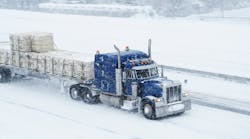With winter in full swing, fleet owners may be thinking about what they should do to care for their diesel engines. The question on the minds of many this time of year is, “Should I let my diesel engine warm up?” Simply put, yes.
In the colder months it’s a good idea to let your engine warm up before you hit the road. Warming the engine allows the fuel to circulate through the engine, which also helps prepare the rest of the fuel in your tank. In addition to warming up your fleet, it’s important to run a premium diesel fuel with cold weather characteristics that align with the temperatures you’ll be operating in.
The characteristics to pay close attention to include:
- Cloud point: The cloud point of diesel fuel refers to the temperature at which wax crystals begin to appear. The temperature a fleet owner would see this happen typically ranges from 4 to 14 degrees Fahrenheit. If your fleet is running within the cloud point of your diesel fuel, not warming up your engine could lead to some potential issues with the fuel filter plugging.
- Cold filter plugging point (CFPP): The CFPP indicates the lowest possible temperature a diesel fuel can still pass through a 45-micron filter. No. 2 diesel fuels have a CFPP that’s typically within a few degrees of the cloud point. Although CFPP is an industry-wide measurement, it can be less accurate for some modern fleet vehicles. While CFPP can be a helpful measurement in some instances, keep in mind its limitations.
- Cetane number: Using a diesel fuel with a high cetane will help ensure your fleet is getting started more smoothly with reduced strain on engines and electrical systems when the weather is chillier. Cetane measures a diesel engine’s start ability, and it’s recommended that fleet owners use a fuel with a cetane number between 46-49.
- Seasonally enhanced blends: Using a winterized premium diesel like Cenex Wintermaster, Roadmaster XL Seasonally Enhanced or Ruby Fieldmaster Seasonally Enhanced provides a seasonally enhanced blend of No. 1 and No. 2 premium diesels. The advanced performance additive package allows for extreme-low-temperature operability that prevents injector fouling and filter plugging to minimize costly downtime.
Another thing fleet owners can do to maintain their diesel fuel tanks is implement a tank maintenance program. This is something fleet owners can do quarterly, and it checks for moisture and contaminants in the fuel tank. If there’s water in the fuel filter, it will compromise filter pleats which opens the door for contamination. A tank maintenance program will help fleet owners identify when they need to change their fuel filters and avoid any water freezing in their fuel tanks.
All these aspects combined with warming up your diesel fuel engine will help your equipment run smoothly this winter. Learn more about Cenex’s Premium Diesel fuel options for the winter months at Cenex.com.



